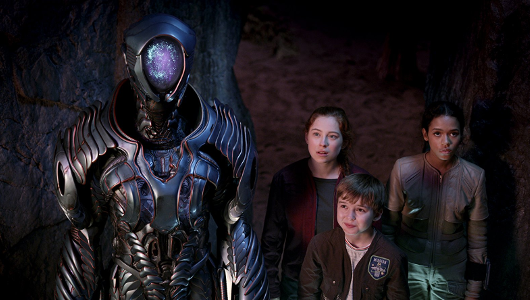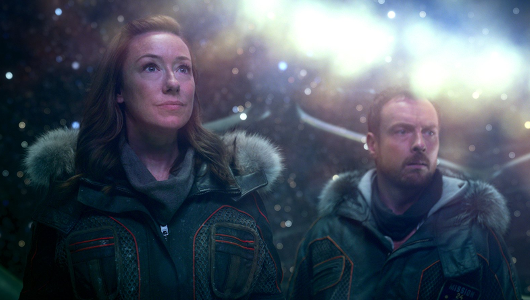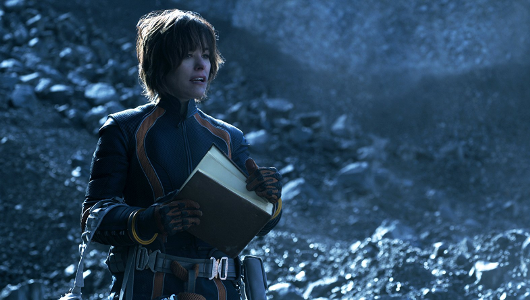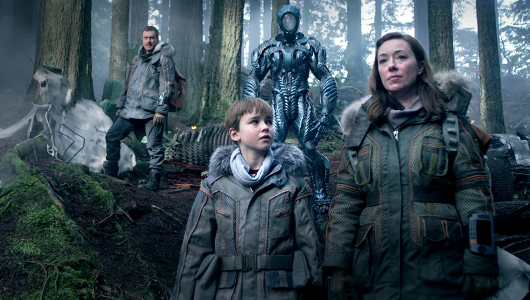Netflix is currently having a resurgence of top-tier Science Fiction, be it Star Trek: Discovery, Altered Carbon and now Lost In Space. Almost exactly twenty years on from a movie of the same name, Netflix brings the 1962 comic and subsequent family-friendly TV show back home to the small screen in what is visually one the best-looking shows of this year.
Lost In Space also signals a push for Netflix putting forward more family friendly or ‘wholesome’ drama television, yet manages to do so without losing any of the edge or awe that one would expect in a sci-fi title about a family in space.
Moreover, compared to earlier offerings of their other big-ticket item – Star Trek: Discovery – Lost In Space does almost everything the former didn’t; from production values, camera shots, narrative and a much leaner focus on a few key people marooned on a mysterious planet.
• Production Company: Sazama Sharpless Productions, Applebox Entertainment, Synthesis Entertainment, Clickety-Clack Productions, Legendary Television
• Original Network: Netflix
• Showrunner: Netflix
• Episodes: 10

The story of the family Robinson (based on The Swiss Family Robinson novel circa 1812): John (Toby Stephens), Maureen (Molly Parker), their two daughters Judy (Taylor Russell) and Penny (Mina Sundwall), along with their son Will (Maxwell Jenkins) is nothing new. In 2018 producers Matt Sazama and Burk Sharpless have done a smart thing by contemporizing the narrative with a heavy focus on visual aesthetics, in line with some of the best movies including The Martian. The setting is realistic, plausible and the threat comes not from within their camp so much as the planet they are stuck on and the natural environment.
Sent on a one-way mission to Alpha Centauri, escaping a dying Earth, the Robinsons represent the elite of Earth’s colonists aboard the Jupiter space shuttles. As part of the broader 24th Colony, they won a spot on the space station Resolute before they were rudely attacked and forced to jettison towards the nearest world.
As the ten episodes go on, this backstory is teased and reflected on with some minor flashbacks and reveals. Yet, this is never fully explained and explored in so far as the focus obstinately always come back to the Robinson’s personal relationship as a dysfunctional family… as if the entire world revolves around them.

This becomes both a positive and negative for the show. On the one hand, Lost In Space is a charming tale of a boy and his Robot (putting aside the thirsty ‘hot robot/bored mum’ memes currently flooding the internet), Will Robinson does a good job unpacking the relationship between a newly discovered Alien Intelligence-come robot (Brian Steele) that may or may not have ulterior motives. It’s the heart of what makes Lost In Space so endearing and yet on the flipside, it detracts from giving other cast members anything to do in the show or any real depth to feel like part of the larger narrative. Other narrative arcs have been spread over the rest of the family each episode and not surprisingly, some well-worn tropes of family life have been rejigged or completely subverted for modern audiences.
Parker carries the show, both as a strong female lead but also as arguably one of the better actors of the show. Playing the role of a single Mother to three super-intelligent children, she’s also the single smartest person of the colonists – having designed all their shuttles and ships. Her two daughters are Judy, who at age eighteen is also the only doctor on the planet, and the sixteen-year-old Penny, who may just be the next rising red-haired star behind Game of Thrones‘ Sophie Turner. Both Sundwall and Russell are largely unknown but are again, one of the most refreshing things about the show. This makes Lost In Space the perfect show to showcase some new up-and-coming talent, as well as hopefully kick-starting some of the younger cast’s careers for years to come.
What it makes up for in visual shots and sweeping vistas, it’s let down by some poor to laughable writing, fed through wooden acting – especially from Stephens’ portrayal of John Robinson and Parker Posey as the now female Doctor Smith.

Because there is only so much danger on a slowly deteriorating alien planet, the producers would have you believe that Doctor Smith is the primary antagonist of the Robinson family. Middling somewhere between frenemy and sociopath creeper, this devolves Posey to mostly sulking for ten episodes, generally acting lonely, selfish and just getting in the way of doing anything useful, without actually doing anything herself. At no real point are the stakes really raised or does she pose any real threat.
Similarly, Stephens diverges little from the overbearing pushy father role, never smiling and generally just doesn’t look like he’s either enjoying himself or wanting to be there in the first place.
The first season is well positioned as a ten-episode arc, although it becomes apparent that the first two episodes are an extended pilot with the remaining eight neatly tying up the main storyline. Thankfully, whilst the show can at times feel overly long – in part due to a lot of the action being mitigated for the sake of family conversations, parent/child bonding and flashbacks – the final episode Danger, Will Robinson smartly manages to change the show in preparation for season two, whilst also tying up most plot points, resolving relationships and yet still leaving a few lingering cliffhangers.

Lost In Space has thus been lampooned as Lost… but in space, and while it may seem apparent that the producers and directors were angling for a similar theme, it never really rises to those lofty heights. This is an unfair comparison, as though the survivors are split into groups, with some mystery to the animals and planet they have landed on. Lost in Space is not supposed to be an introspective exploration of the meaning of life or religion.
Sam McCurdy has outdone himself with the cinematography instantly setting the tone of an alien world that smartly adds minimal CGI to sweeping shots of desert plains and tundra that turn into forests and rivers juxtaposed against icy ravines and snow storms. Quite literally it is four seasons in one day on the planet, and each episode seems to highlight a new natural phenomenon. The vast outdoor vista as well is in stark contrast to the claustrophobic close up shots inside the shuttles or the blackness of space.
Less campy than its 60’s iteration and less cheesy than the Hollywood remake of 98, ultimately Lost in Space is fun for the whole family. Some of the acting might be a bit on the nose and laughable, but for younger viewers, teens and even young adults there is enough here to excite, intrigue and wonder.
Tags: adventure, Burk Sharpless, Family drama, Ignacio Serricchio, Irwin Allen, Lost In Space, Matt Sazama, Maxwell Jenkins, Mina Sundwall, Molly Parker, Netflix, Parker Posey, Science Fiction, Taylor Russell, Toby Stephens


